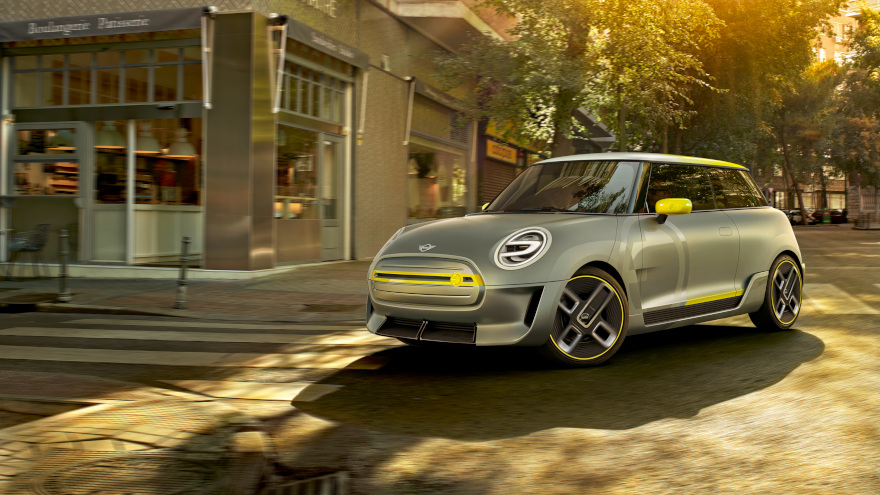63% of consumers surveyed by MINI gave specific reason for driving EVs

The the MINI Cooper S E electric vehicle is coming in early 2020. Photo courtesy of the automaker.
By subscribing, you agree to receive communications from Auto Remarketing and our partners in accordance with our Privacy Policy. We may share your information with select partners and sponsors who may contact you about their products and services. You may unsubscribe at any time.
WOODCLIFF LAKE, N.J., and CHARLOTTE, N.C –
After an electric company in the Southeast rolled out a strategy to spark more usage of electric vehicles (EVs), a new survey recently commissioned by MINI showed how consumers are zeroing in on how they want to use an EV.
The automaker reported on Friday that 63% of survey participants said the best way to use an EV is for commuting or city driving. At the same time, 73% of consumers surveyed said that battery range of up to 75 miles was sufficient for their daily use.
At the other end of the spectrum, the survey found that there is a need for additional consumer education around EVs, especially when it comes to charging technology and maximizing electric mobility solutions. Nearly three-quarters (74%) of consumers surveyed did not know where their nearest EV charging station was located. At the same time company data shows that 80 percent of EV owners tend to charge their vehicles at home.
When consumers were asked to choose an acceptable amount of time it should take to charge an EV, the most common answer (28 percent) was ‘‘I don’t know” followed by “30 minutes” (25 percent).
“It is important for us as a brand to understand how consumers want to use their electric vehicles, and what they know and don’t know about them as we move closer to the launch of the MINI Cooper S E electric vehicle in the U.S.,” MINI head of corporate communications Andrew Cutler said in a news release.
“The more intelligence we gather, the more we can educate consumers about the many benefits of electric mobility and what MINI has to offer in the new MINI Cooper S E electric vehicle coming in early 2020,” Cutler continued.
Subscribe to Auto Remarketing to stay informed and stay ahead.
By subscribing, you agree to receive communications from Auto Remarketing and our partners in accordance with our Privacy Policy. We may share your information with select partners and sponsors who may contact you about their products and services. You may unsubscribe at any time.
Overall, two-thirds (66 percent) of consumers surveyed in MINI’s endeavor believe that EVs are for early adopters, underscoring the need to raise mainstream awareness around EV technology. The OEM explained this finding may also explain that while Federal Tax Credits on EVs certainly incentivize consumers to purchase an EV, there is still a subset of the population that is making the choice to purchase an EV based on factors beyond incentives.
Market research and business intelligence firm Engine International orchestrated MINI’s general population survey during a three-day span beginning on March 21 among a sample of 1,004 adults comprising 502 men and 502 women age 18 and older.
Whether or not consumers in North Carolina are charging an EV manufactured by MINI or another automaker, Duke Energy is proposing what the company said the largest investment in electric vehicle (EV) infrastructure ever in the Southeast — a $76 million initiative to spur EV adoption across the state.
In a filing with the North Carolina Utilities Commission (NCUC) delivered in early April, Duke Energy outlined its watershed program that will provide incentives to customers. The company said it will also lead to a statewide network of fast-charging stations to meet growing demand.
The three-year program requires NCUC approval, according to a news release that contained a link to the entire proposal.
“North Carolina deserves a cleaner and smarter energy future, and supporting the use of electric transportation is a Duke Energy priority that will benefit our communities, customers and our state’s future,” said Lang Reynolds, Duke Energy’s director of electrification strategy. “This initiative will help accelerate public and private EV use while also reducing carbon emissions.”
Duke Energy’s proposal will help fund the adoption of electric school buses, electric public transportation, and will lead to almost 2,500 new charging stations in the state.
Currently, the company said North Carolina has more than 10,000 plug-in hybrid and all-electric vehicles, and the state has approximately 600 public charging stations. This program would more than double that amount, according to Duke Energy.


